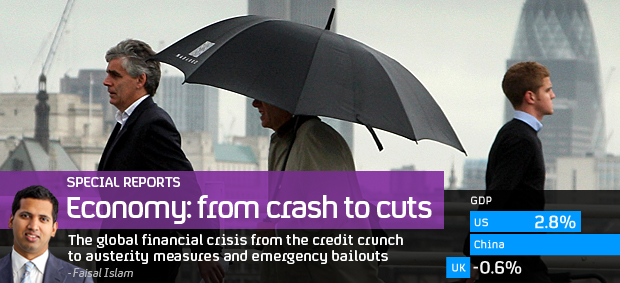Will Treasury infrastructure plans help the taxpayer?
Plans for a mixture of loans and guarantees to boost UK infrastructure and exports are unveiled by the government – but will this provide the economic jumpstart the UK needs?
The plans will see the government offering guarantees on £40bn of private sector loans to infrastructure projects, as well as offering direct loans to Public Private Partnership (PPP) projects and foreign buyers of UK exports.
Chancellor George Osborne and chief secretary to the Treasury Danny Alexander announced the scheme, which they said will provide a “significant boost to the economy.”
The loans cover three areas:
• Infrastructure: the government will provide guarantees for up to £40bn of private sector loans for major infrastructure projects.
• Public private partnership: the government will provide temporary loans to up to 30 public private partnership projects worth an estimated £6bn.
• Exports: the government will provide guarantees on foreign loans to overseas buyers of UK exports.
It is hoped that the cost of these plans to the taxpayer will be minimal, and the government has reduced its exposure to risk by insisting that infrastructure projects that receive the guarantees meet a strict set of criteria.
These criteria include that the project: must be ready too start within 12 months, must be of “national significance”, must offer “value for money” to the taxpayer and must be “financially credible”.
Britain’s credibility has been hard-won and involved difficult decisions, so I want to make sure its benefits are passed on to the whole economy – George Osborne
The types of projects which will receive the backing are likely to come from the trasnport, utilities, communications and energy sectors.
Projects eligible for the scheme could come from a list of 500 projects published by the government as a part of the National Infrastructure Plan 2011. The plans also follow infrastructure investment announcements made by Mr Osborne in November 2011.
Examples of projects that could be eligible include the £65m extension to the runway and associated works at Birmingham airport, improvements to the rail network between Manchester and Liverpool and a £3bn upgrade to mobile networks.
Applications for the guarantees can be made from today and it is estimated the scheme will run until 2014.
PPP projects will benefit from direct loans from the government. These loans, designed to fill the gap left from hard-to-access long-term finance, will be made on commercial terms.
With Britain in a double-dip recession because of the Chancellor’s failed policies anything which helps to get the economy moving again is welcome. But these proposals do not go far enough – Rachel Reeves
Additionally the Treasury will guarantee loans from foreign banks to foreign companies to facilitate the purchase of UK exports. Providing guarantees to bolster UK exports is already something carried out by the government, but under the new scheme the government will guarantee short term loans because banks are less inclined to lend for longer periods.

Will this boost the economy?
Mr Osborne and Mr Alexander said the plans follow successful action taken to improve the UK economy, and that lasting benefits will be provided to thousands of people.
Mr Osborne said: “The credibility the government has earned through tackling the deficit is already helping millions of British families and businesses through keeping down the cost of borrowing.
“Britain’s credibility has been hard-won and involved difficult decisions, so I want to make sure its benefits are passed on to the whole economy.”
Mr Alexander said: “This is yet another example of the coalition working together to put its hard-earned economic credibility to work to increase growth.”
The scheme was also welcomed by business lobbying organisation CBI. Director-general John Cridland said: “This announcement marks a big step towards unlocking the £250bn of investment needed to renew our national infrastructure, two-thirds of which has to come from the private sector.
“With bank lending still constrained, we must make it attractive for new finance providers to step in and fill the gap. A combination of direct lending and loan guarantees should help to make infrastructure assets more attractive while protecting our fiscal position.
“Pension funds and other investors will be encouraged by the Government’s attempt to reduce risk by using its funding power to boost the investment grade of a range of projects.
“While the Government’s proposals address infrastructure financing, we now need to focus on project models to ensure delivery of the world-class infrastructure this country needs.”
With a multiplicity of legal and administrative, let alone financial hurdles to clear before any infrastructure renewal project gets off the ground, the new guarantees may not be the panacea the government intends.
“It is a perfectly respectable idea to use the government’s credibility,” pointed out Professor Tony Travers of the London School of Economics. “But the guarantees won’t deliver nearly as much as they could if there are not swift processes in place to get the projects ready to go.
“If it can be done quickly and effectively then fine,” but, the professor warns, many schemes are not that well advanced: “I think a large number of projects are very difficult to speed though to delivery.”
Not far enough?
Rachel Reeves, shadow chief secretary to the Treasury, said: “With Britain in a double-dip recession because of the Chancellor’s failed policies anything which helps to get the economy moving again is welcome. But these proposals do not go far enough.
“There is no guarantee that government-backed loans will see any infrastructure projects going ahead in the next year which wouldn’t have happened anyway. And they will not reverse the damage done by two years of deep cuts to long-term projects like house building and the school building programme which have seen a collapse in the construction sector.
“As for loans to support public private partnership (PPP) infrastructure projects, this is yet another u-turn as George Osborne axed this Labour government scheme two years ago.”
